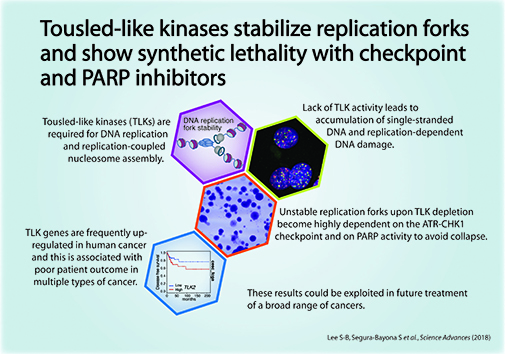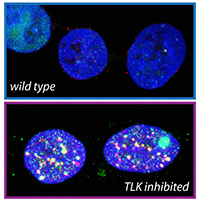DNA replication enzymes can provide chemosensitivity
Published in Science Advances, a study from the Groth laboratory BRIC, University of Copenhagen and theStracker group at IRB, Barcelona, shows that TLK1/2 enzymes are critical for faithful copying of the DNA and that TLK1/2 depletion enhances effectiveness of chemotherapeutic agents currently in clinical trials.
During cell growth, cells must copy their DNA through a process called DNA replication. For this process to be accurate, the genetic as well as the epigenetic information must be flawlessly copied. In this regard, the researchers in Copenhagen and Barcelona have now identified a key role for the TLK1 and TLK2 enzymes in DNA replication. The research is based on previous studies that suggested that TLK1/2 could be candidate targets in cancer therapy and provides new molecular details on their important functions in cancer cell proliferation.
“We have discovered that TLK activity is important to ensure proper packaging of newly synthesized DNA into chromatin and prevent DNA damage during the replication process. Our work also reveals that TLK inactivation potentiates cell killing by checkpoint inhibitors and provides a rationale for targeting TLKs in cancer treatment”, explains Professor Anja Groth.
Providing the fuel for the faithful duplication of DNA
The researchers demonstrated that TLK1 and TLK2 activity is crucial for regulating the supply of histones, abundant proteins that protect the DNA, provide structure and carry epigenetic information. By ensuring sufficient new histones for chromatin assembly, the TLKs promote chromatin restoration and stabilize DNA during replication.
Potential targets for cancer therapy
The researchers examined the status of the TLK1 and TLK2 genes in over 7000 patient samples made publically available by the Cancer Genome Atlas project. They found that TLK1 and TLK2 are rarely mutated in cancers, suggesting a potentially conserved role. In many cases the TLK1 and TLK2 genes were duplicated or over-expressed and in several cancer types, high expression correlated with poor patient outcome.
While TLK1/2 have been proposed to be potential targets for cancer therapy, this work demonstrates that their inhibition could be useful for the treatment of various kinds of cancer and may enhance the activity of several chemotherapeutic agents currently in clinical trials. This provides further evidence that these enzymes may be important targets for future drug development.
This collaborative study has used state-of-the-art molecular approaches to analyze DNA replication and DNA damage, as well as the computational analysis of publicly available cancer data from the Cancer Genome Atlas (TCGA) project and was also made in collaboration with Camille Stephan-Otto Attolini, head of the Biostatistics and Bioinformatics Facility at IRB Barcelona.
Work at BRIC has been supported by the Lundbeck Foundation, the Danish Cancer Society, the Danish National Research Foundation to the Center for Epigenetics [DNRF82], the European Commission ITN FP7 'aDDRess', a European Research Council Starting Grant, the Independent Research Fund Denmark, the NEYE Foundation, and the Novo Nordisk Foundation.

Contact
Professor Anja Groth
Phone: +45 35325538
e-mail: Anja.groth@bric.ku.dk
Original paper
S.-B. Lee, S. Segura-Bayona, M. Villamor-Pay., G. Saredi, M. A. M. Todd, C. S.-O. Attolini, T.-Y. Chang, T. H. Stracker, A. Groth. Tousled-like kinases stabilize replication forks and show synthetic lethality with checkpoint and PARP inhibitors. Sci. Adv. 4, eaat4985 (2018).

